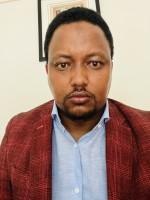-

Hear from Monica Toft, Academic Dean
Learn how Monica Toft, Academic Dean, is shaping the study of global affairs and diplomacy at Fletcher.
Hear from Prof. Toft -

Explore Fletcher academics in action
Fletcher Features offers insights, innovation, stories and expertise by scholars.
Get global insights -
Get application tips right from the source
Learn tips, tricks, and behind-the-scenes insights on applying to Fletcher from our admissions counselors.
Hear from Admissions -

Research that the world is talking about
Stay up to date on the latest research, innovation, and thought leadership from our newsroom.
Stay informed -
Meet Fletcherites and their stories
Get to know our vibrant community through news stories highlighting faculty, students, and alumni.
Meet Fletcherites -

Forge your future after Fletcher
Watch to see how Fletcher prepares global thinkers for success across industries.
See the impact -

Global insights and expertise, on demand.
Need a global affairs expert for a timely and insightful take? Fletcher faculty are available for media inquiries.
Get in Touch
An Interview with Ahmed Khalif (MAHA '21)
County Director, Action Against Hunger in Somalia
For Fletcher MAHA alum Ahmed Khalif, a big part of his job involves ensuring the safety of his team of humanitarian workers, a burden he does not carry lightly, as he discusses in this short Q&A. Click to learn more about Action Against Hunger.
Please tell us about the work you are currently doing.
As the country director for Action Against Hunger in Somalia, it is my job to provide vision and strategic leadership to the country office. The responsibilities include program execution, strategy development, program quality monitoring and impact, human resources management, financial stewardship, resource acquisition, and overall operations, including the safety and security of the team.
The best part of my job is making a difference in people's lives every day. Most of the time, we work in areas that are hard to get to or where security makes it a problem to provide humanitarian assistance. In these cases, we are usually the provider of first resort. One thing that challenges and constantly worries me is the safety and security of my team. We need to review and adapt our security plans to the changing security landscape in the county in order to operate safely and securely at all times. Additionally, as an organization, we put a high priority on staff safety and commit resources to it.
How did your experience at Fletcher prepare you for this role?
The MAHA degree program was a major turning point in my career path. I started the course when there was a pandemic, so I had to provide leadership to the COVID-19 response team and take some classes late at night. I learned to be patient, but more fundamentally, the program gave me a unique mix of new humanitarian skills and academic rigor, with a focus on nutrition and food security in complex emergencies in a world that is becoming more urbanized.
I enjoyed the rich exchange of ideas with students and faculty members who have solid experience in Africa. The course has enabled me to take on additional leadership responsibilities in my current organization: To support in leading the Horn of Africa Drought Crisis work and coordinate with diverse teams in the region as well as the U.S. office to develop and implement a drought and famine prevention response.
How do you recognize World Humanitarian Day?
It is a special day for me to reflect on the humanitarian imperative and the necessary disruptions that challenge humanitarianism. As we commemorate World Humanitarian Day, I would like everyone to remember the 140 humanitarian aid workers who were killed last year in the pursuit of reaching the most vulnerable people in many parts of the world. It should also be used to raise awareness on extra risks faced by female humanitarians in the field.


